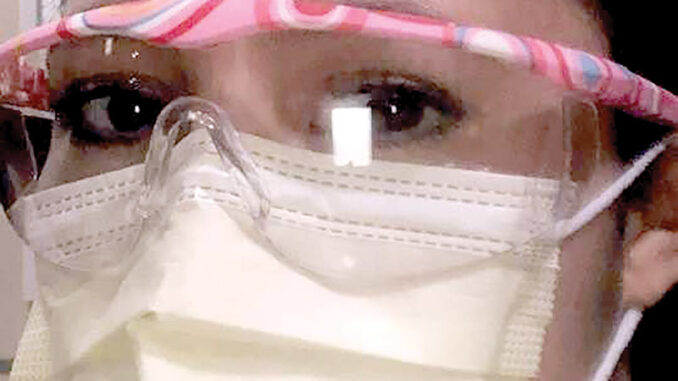
By Christine Armario
Associated Press
BOGOTA, Colombia (AP) – No one should have known Bella Lamilla’s name.
But within hours of her diagnosis as Ecuador’s coronavirus “patient zero,” it was circulating on social media along with photos showing the retired schoolteacher unconscious and intubated in a hospital bed. Her large, close-knit family watched in horror as a dual tragedy began to unfold: While Lamilla fought for her life in intensive care, strangers began tearing apart her reputation online.

In this March 26, 2020, photo, relatives of Bella Lamilla the first person to be diagnosed with coronavirus in Ecuador, maintain quarantine in their home in Babahoyo, Ecuador. The spreading global pandemic has tested the competing interests of public health and privacy, with thousands of individuals and families experiencing both physical illness and the less-discussed stigma that can come with it. While there are many stories about good deeds and people coming together, the coronavirus is also bringing out another, darker side of some people: Fear, anger, resentment and shaming. (AP Photo/Mariuxi Orellana)
“Knowing she had it, the old lady didn’t care and went all around,” one person commented on Facebook.
“It was ugly,” said Pedro Valenzuela, 22, Lamilla’s great-nephew. “It hurt a lot.”
The spreading global pandemic has tested the competing interests of public health and privacy, with thousands of individuals and families experiencing both physical illness and the less-discussed stigma that can come with it.
While there are many stories about good deeds and people coming together, the coronavirus is also bringing out another, darker side of some people: Fear, anger, resentment and shaming.
In India, doctors have reported being evicted by landlords worried they’ll spread coronavirus to other tenants. In the town of St. Michel in Haiti, people stoned an orphanage after a Belgian volunteer was diagnosed. In Indonesia, an early coronavirus patient was subjected to cruel innuendo suggesting she contracted it through sex work.
Psychologists say it harkens to an age-old instinct to protect oneself and relatives from catching a potentially fatal disease – and a belief, however unfounded, that those who get it bear some responsibility.
“Illness is one of the fundamental fears humans have been dealing with their entire evolution,” said Jeff Sherman, a psychology professor at the University of California, Davis. “It’s not really surprising they would be hostile toward someone they believe is responsible for bringing illness into their community.”
Bella Lamilla followed a daughter to Spain three years ago to enjoy retirement alongside three grandchildren in a sleepy Madrid suburb. At least once a year, she flew back to Ecuador, where a flock of relatives would greet her at the airport.
On Feb. 14 she made the 12-hour flight to Ecuador and sailed through immigration, no questions asked, even though she’d started feeling feverish.
Over the next week, relatives took her to two different local doctors, who dismissed her ailments as side effects of a urinary infection or a possible muscular problem, and finally to a private clinic in the city of Guayaquil. Struggling to breathe, Lamilla was put on a ventilator.
After then-Health Minister Catalina Andramuño announced Ecuador’s first case in a live news conference, the rumors and fury almost immediately began swirling on social media.
A medical document with Lamilla’s name surfaced. So did photos and videos showing the petite woman with short blonde hair in a hospital bed. A map with addresses of the family’s homes made the rounds. Facebook users dredged up old photographs of the family at a soccer game to imply they’d exposed thousands.
“How irresponsible,” one man remarked on pictures of relatives celebrating Lamilla’s recent return before her diagnosis.
A few family members defended Lamilla, while others, too distressed by the vitriol, avoided social media entirely. They knew Lamilla would have been mortified to discover she’d potentially spread it to relatives.
“I couldn’t look at anything,” Lamilla’s daughter said. “I didn’t want to hurt my heart.”
Patients elsewhere whose identities became public have endured similar attacks.
Minutes after Indonesia announced its first two cases, the names of Sita Tyasutami and her mother leaked online with their phone numbers and home address. Hundreds of WhatsApp messages flooded in.
People shared photos of Tyasutami, a 31-year-old professional dancer, shimmying in a feathered Brazilian samba bikini, and spread baseless speculation that she contracted the virus after being “rented” by a foreign male client.
“My face is everywhere now, I can’t hide it,” she said.
Studies show that when people link disease to behavior, they are more likely to blame the sick and ostracize them.
A survey in Hong Kong several years after the 2003 SARS outbreak, another coronavirus that killed nearly 800, found a small portion of the population still held negative views of those who had contracted it.
“Generally speaking, stigma of infectious diseases can be as devastating to the infected individuals as the diseases themselves,” the authors wrote.
For most people the coronavirus causes mild or moderate symptoms like a fever and cough. But for others, especially older adults and people with existing health problems, it can cause more severe illness, including pneumonia, and lead to death.
Lamilla died March 13. By that time, about a dozen relatives had tested positive.
One of the most seriously ill, Lamilla’s youngest sister, Charito Lamilla, 61, began struggling to breathe. Relatives tried for two hours to get an ambulance – but none arrived.
Provincial Gov. Camilo Salinas said later that an ambulance that should have been available was transporting a different coronavirus patient but got blocked by people who did not want it to reach the medical center, fearful of contagion.
A day later Charito Lamilla became Ecuador’s second coronavirus fatality.

